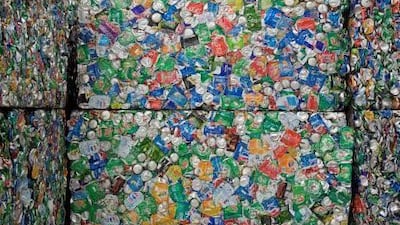Waste management is one of the most important environmental issues facing the Government.
The UAE is working hard to reduce its rate of waste per capita, which is one of the highest in the world.
Studies in 2010 by the Centre of Waste Management Abu Dhabi estimated that the emirate produces between 1.8 kilograms and 2.4kg per person per day - almost double the level of the United Kingdom.
Experts believe the figures are representative of the whole country.
Recycling schemes play a major role in efforts to tackle the issue. In Sharjah, the municipal company Bee'ah recycles about 52 per cent of the emirate's waste, according to Najib Faris, chief commercial officer at the company.
Sharjah produces 1.8 million tonnes of waste annually, he said.
"The idea of proper waste management is very new in the Gulf," he said, but the concept is gaining popularity, particularly in the UAE.
Mr Faris said that when he joined the company four years ago, Sharjah's residents struggled with the concept of segregating waste, but now "awareness is growing and the market is developing".
Bee'ah sent its staff in 2011 to households to explain how recycling bins should be used. It has since made bins available to most offices and villas and even to many high-rise residential buildings.
This has helped Sharjah residents embrace the need to recycle.
"Today we have about 70 to 75 per cent accuracy in recycling in pedestrian bins and that is impressive," Mr Faris said. "People have started realising that it is easy to recycle."
Bee'ah is hoping to recycle 67 per cent of its waste by 2015. After that, Sharjah will have a waste-to-energy plant where rubbish that cannot be recycled will be burned.
Recycling schemes are also being implemented in some neighbourhoods of Abu Dhabi, although the emirate is still unable to reprocess some of the materials collected.
In March 2011, the Centre of Waste Management Abu Dhabi launched Nadafa, a waste-reduction scheme targeting commercial establishments.
The initiative requires companies to report their waste production and those producing the most are required to implement reduction and recycling schemes.
Companies are also charged an annual fee of Dh225 per tonne of waste, with a cap of Dh50,000 a year.
In Dubai, many malls, hotels and private residential compounds have recognised that recycling schemes can generate income and boost their image, said Huzaifa Rangwala, marketing and contracts manager at Union Paper Mills.
Dubai Municipality introduced regulations requiring shopping malls to run recycling schemes from February this year.
But, Mr Rangwala said, more steps needed to be taken across the country to support recycling.
"The future of the industry is not bad but it depends on steps taken by the Government to encourage local recyclers," he said.
One issue is competition from overseas processing plants, usually in China and India, for used paper and plastics.
Better implementation of the existing rules, higher fees to dump waste at landfills and a tax on exporting segregated recycled materials will give local recyclers a much-needed boost, Mr Rangwala said.

